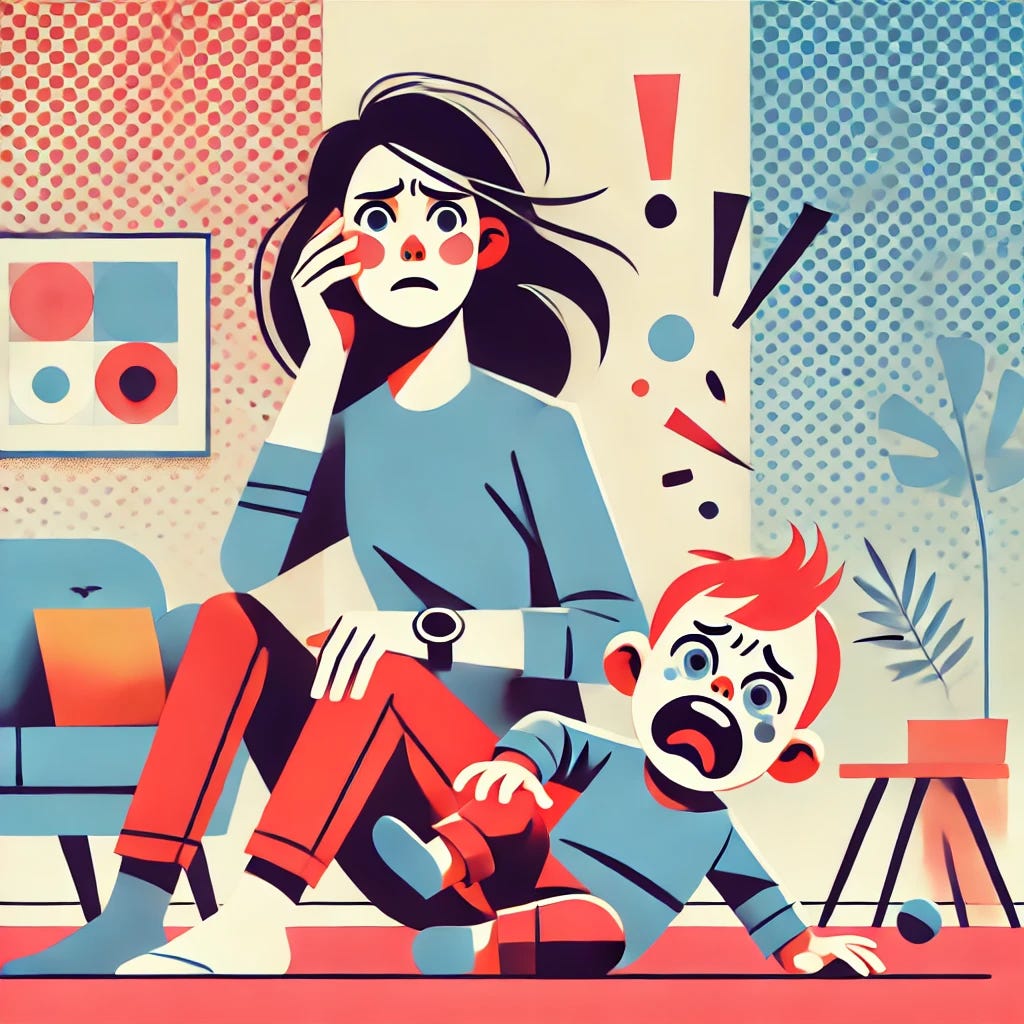How Easy Is It To Accidentally Screw Up Your Kids?
Why moms are panicking that doing the dishes will cause lifelong trauma
Every parent knows one thing: we are going to screw up our kids. If our kids ever go to therapy, we will be subject matter, and it won’t always be in a positive light. And for the most part, we accept this. We know that we are probably overcorrecting for our parents’ shortcomings, doing our best but inevitably creating new problems. Our hope, I suppose, is that the problems we create will be purely accidental, not as bad as whatever our parents did to us, and our kids will be able to say they had “good parents” and a “happy childhood” even if we made mistakes sometimes.
But I–and probably many other anxious parents, if my social media feeds are correct–feel that it’s not good enough to try our best, because trying our best isn’t actually good enough. Increasingly, it seems that even if you think you’ve done everything right, even if you don’t hit or yell or even give time-outs, you will be traumatizing your child in some way you don’t even realize, and they’ll never trust you again.
This sounds like hyperbole, but if you spend a good amount of time in neurotic parenting spaces (as I do, because I am a neurotic parent who writes about neurotic parenting) you’ll see that these fears are pretty common. I don’t want to link to these threads specifically, because I would be horrified if some frantic, anxious post of mine somehow made it onto a stranger’s Substack, but on r/ScienceBasedParenting, a Reddit sub that seems to skew toward even the most neurotic parents on Reddit (which is really saying something) a common question is, more or less, “Did I accidentally ruin my child?”
These aren’t parents who actually abuse or neglect their kids. These are parents who did everyday things or made small mistakes–things that might not even have been considered mistakes in the ‘90s– that they are afraid will have permanent and severe consequences. These are examples of the kind of thing I see all the time:
Did my baby develop a permanent attachment disorder because she doesn’t seem scared of her daycare teachers, and doesn’t cry when I drop her off?
Did I cause lifelong trauma because I slept through my baby crying in the middle of the night and my baby was awake for an hour by himself?
I yelled at my 3-year-old when she hit me. Will she be scared of me forever?
My 2-year-old was having a tantrum and I put him in his playpen to calm down because nothing else was working. Did he perceive this as emotional abandonment?
I scroll on my phone around my baby, especially when nursing. Will this prevent her from ever forming an attachment to me?
What’s especially troubling about these types of posts is that they are happening in the echo chamber of neuroticism, so nobody is there to say “Hold the brakes, this is insane.” I mean, don’t get me wrong, a lot of the time someone will comment to tell the OP that they have nothing to worry about, but by then the damage is done, because the more of these posts that are made, the more other people–lurkers who may not even post–are led to believe these fears are reasonable. It’s one thing if my experienced parent friend tell me, “It’s not going to cause lasting damage if you finish the dishes before going up to get your baby from the crib” and a completely different thing if I worry about that, and then I see someone else posting about the same fear, certain that their baby will become a serial killer because of it.
While these posts exist in echo chambers, they don’t happen in a vacuum. Increasingly, parents (almost always moms) are subject to an onslaught of parenting influencers and “experts,” some of whom have real credentials, who make fearmongering assertions that simply can’t be true, because for these claims to be true, all of humanity would have to be suffering from severe trauma up until ten years ago.
Take Erica Komisar, a psychoanalyst and clinical social worker with incredibly weird glasses. The only reason I even know about her is that she regularly goes viral on social media for brief cuts of her interviews where she lambastes daycare, a hot topic these days. But before she did numbers on Reels, she was most famous for her book “Being There: Why Prioritizing Motherhood in the First Three Years Matters.” Not lost on me is her theory that the only way to “prioritize motherhood” is to be a stay-at-home mom (she graciously makes exceptions for one hour per day of part-time work), or that apparently prioritizing fatherhood isn’t important. (Moms are guilted into giving up their careers and all of their free time–you know what people “guilt” fathers into doing? Occasionally playing with their kids.)
But crucially, according to Komisar, being a stay-at-home mom is simply not enough, because doing anything other than spending time with your children is a form of neglect and abandonment, including things that stay-at-home moms have to do to keep their houses running. One Amazon review of her book sums it up pretty well:





